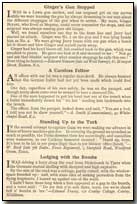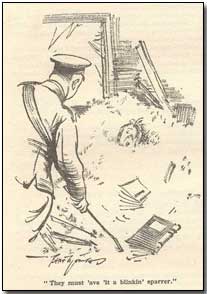Memoirs & Diaries - The Best 500 Cockney War Stories - A Careless Fellow and Other Stories
 Published in London
in 1921, The Best 500 Cockney War Stories
comprised, in the words of its newspaper publisher (The London Evening
News) "a remembering and retelling of those war days when laughter
sometimes saved men's reason".
Published in London
in 1921, The Best 500 Cockney War Stories
comprised, in the words of its newspaper publisher (The London Evening
News) "a remembering and retelling of those war days when laughter
sometimes saved men's reason".
The collection of short memoirs, some 500 in total, is divided into five categories - Action, Lull, Hospital, High Seas and Here and There. This page contains five stories from Action, led by A Careless Fellow.
Other sections within the collection can be accessed using the sidebar to the right.
A Careless Fellow
An officer with our lot was a regular dare-devil. He always boasted that the German bullet had not yet been made which could find him.
One day, regardless of his own safety, he was on the parapet, and though many shots came over he seemed to bear a charmed life.
One of the men happened to put his head just out of the trench when a bullet immediately struck his "tin hat" sending him backwards into the trench.
The officer, from the parapet, looked down and said, "You are a fool, I told you not to show yourself."
A. Smith (Cameronians), 40 Whitechapel Road, E.1
Standing up to the Turk
In the second attempt to capture Gaza we were making our advance in face of heavy machine-gun fire.
In covering the ground we crouched as much as possible, the Turks directed their fire accordingly, and casualties were numerous, so our Cockney humorist shouted: " Stand up, boys. It's best to be hit in yer props (legs) than in yer blinkin' office (head)."
W. Reed (late 7th Battn., Essex Regiment), 3 Shenfield Road, Woodford Green, Essex
Lodging with the Bombs
I was driving a lorry along the road from Dickebusch to Ypres when the Germans started shelling with shrapnel and high explosive.
By the side of the road was a cottage, partly ruined, with the window space boarded up: and, with some idea of seeking protection from the flying fragments, I leaned up against one of the walls.
I hadn't been there long when a face appeared at a gap in the boards, and a voice said: " Do yer fink y're safe there, mate, cos we're chock full o' bombs in 'ere."
Edward Tracey, c/o Cowley Cottage, Cowley, Middlesex
In Fine Feather
While on the Somme in 1916 my battery was sent to rest in a village behind the line.
The billet allotted to us had been an hotel, and all the furniture, including bedsteads and feather mattresses, had been stored in the room which did duty as an orderly room.
Returning one day from exercise, we saw a flight of enemy 'planes coming over, and as we approached the billet a bomb was dropped straight through the roof of our building, the sole occupant of which at the time was a Cockney signaller on duty, in touch with Brigade Headquarters.
We hurried forward, expecting to find that our signaller had been killed.
The orderly room was a scene of indescribable chaos. Papers were everywhere. Files and returns were mixed up with "iron rations," while in a corner of the room was a pile of feathers about 4 feet deep - all that remained of the feather mattresses. Of our signaller there was no sign.
As we looked around, however, his head appeared from beneath the feather pile. His face was streaming with blood, and he looked more dead than alive, but as he surveyed his temporary resting-place, a grin spread over his features, and he picked up a handful of feathers.
"Blimey!" he observed, "they must 'ave 'it a blinkin' sparrer."
"Gunner," Oxford Street, W.1
All the Fun of the Fair
At Neuve Eglise, March 1918, we were suddenly attacked by Jerry, but drove him back. Every now and again we spotted Germans dodging across a gap in a hedge. At once a competition started as to who could catch a German with a bullet as he ran across the gap.
"Reminds me of shooting at the bottles and fings at the fair," said my pal, another Cockney Highlander.
A second later a piece of shrapnel caught him in the hand. "Blimey, I always said broken glass was dangerous," he remarked as he gazed sadly at the wound.
F. Adams (late H.L.I.), 64 Homestead Road, Becontree, Essex
Next - Teacup in a Storm and four other stories
A Runner was a soldier who carried messages by hand.
- Did you know?

